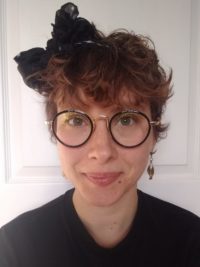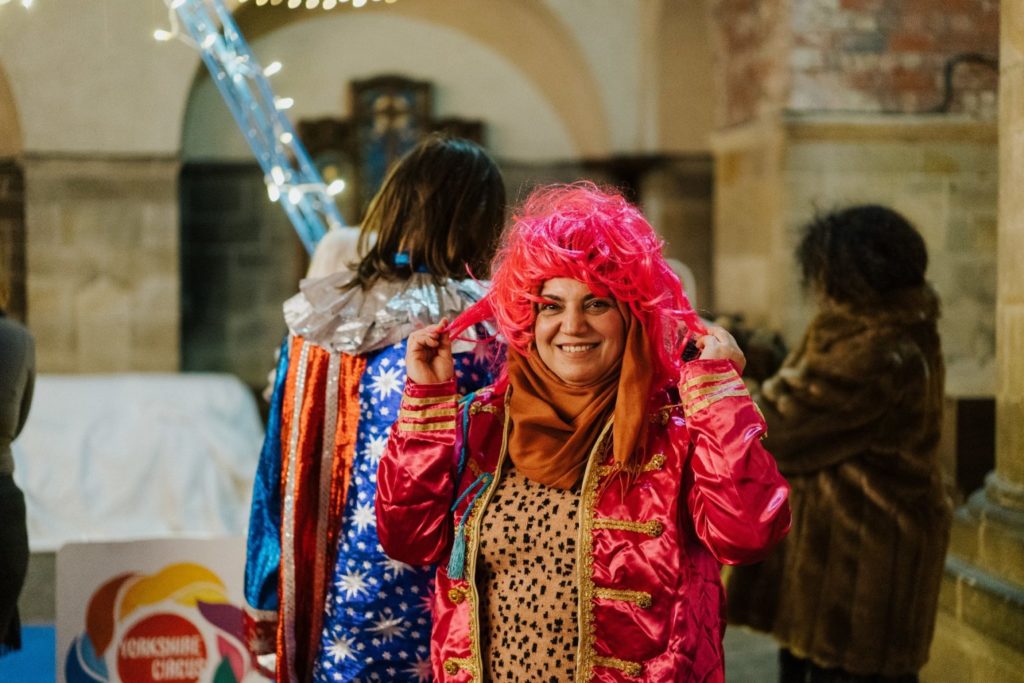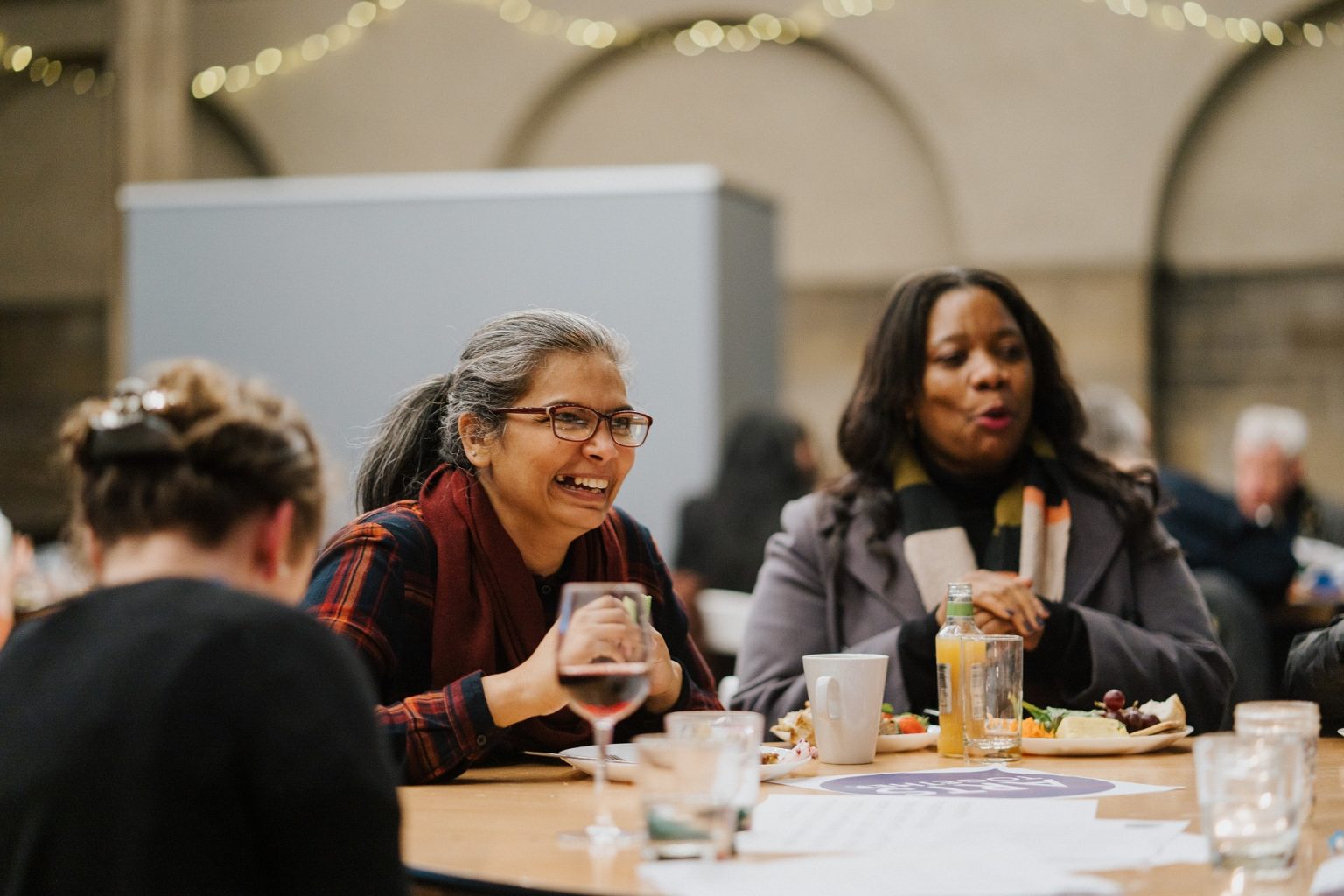
Hope Bachmann is in her second year of a collaborative PhD with Opera North and The University of Leeds, in the School of Politics and International Studies. Her PhD is titled ‘Arts engagement and storytelling as pathways to solidarity with refugees’.
What is your PhD project about?
I am doing a PhD with the University of Leeds, in collaboration with Opera North, and I am funded by WRoCAH. My PhD is looking at how solidarity with refugees and asylum seekers is facilitated though arts engagement. Opera North was awarded Theatre of Sanctuary in recognition for how much and for the quality of the work they do with refugees and asylum seekers, so makes them a really interesting case study for this kind of project. There’s a lot of theoretical literature in political theory that talks about solidarity, what it is and what it looks like but it’s not based in reality, it’s not what we think of when we say we’re in solidarity, it’s not what we see when we think of examples of acts or movements of solidarity.
This project offers an opportunity to study a real life situation where solidarity is happening. My project looks at lining up the theoretical world and the real world, exploring the similarities and differences. What can we learn from one, and take to the other? There will be some things we will learn from the relationship that Opera North have with refugees & asylum seekers through their Encore programme and then we’ll be able look at the theoretical work and see what is missing. We’ll also be able to see what Opera North’s relationships are missing and how they could be better by incorporating the theory. It’s a two way relationship.

Arts Together Festive Event, 2019. Photo credit Tom Arber
What were you doing before that made you interested in doing this topic, and what attracted you to work at Opera North?
I went to art college, I did an UG in creative writing and a Masters in philosophy. I’ve worked with homeless and mental health charities, volunteering and as jobs. My grandparents were refugees from Germany, they were German Jews who came over to the UK as part of the Kindertransport during WW2. So that’s always been a thread throughout my life that that’s the history that we have. It was also very important to my great grandma that we were all educated on what she had been through and that we all understood what had happened and that we all try to live our lives in such a way to make sure that nothing like that ever happens again. Those were messages that were hammered home to me at such a young age so even though they weren’t alive for much of my life, it’s a big part of my life and my identity, and my families identity as well. When I finished my masters I knew I wanted to do a PhD but also wasn’t really sure so I took some time out. I saw this advert for the PhD with Opera North and it was about the three things I’m most passionate about, storytelling, arts engagement and solidarity.
For my undergraduate thesis I did a retelling of the Mabinogion, which is best described as being the Welsh equivalent of the Grimms’ Fairy Tales, from different perspectives, so storytelling is something that I love. And arts engagement is something that’s been a theme through my life, I’ve done a lot of different arts things. So all of these things together, it was my dream PhD.
Also a common thing with PhD students is isolation. You’re working on a project that no one else is working on, so I was really interested in doing a collaborative PhD where I get to work with and be a part of an organisation whilst I work on my project. I’m still an independent researcher but I’m part of a team at the same time, and it’s very valuable and rewarding.
What stage are you currently at?
I’m in my second year now, I started in September 2019. Your first year of a PhD is very unlike any of the other years. In the first year you’re learning how to do one, I learnt how to use referencing software and I audited modules in political theory and community justice. I come from a creative writing and philosophy background it gives you a baseline of an understanding into political theory.
You also do your literature review in your first year so I spent a huge proportion of the year reading and making notes and submitting drafts of chapters you have to do again and again. The last thing I wrote that was as long as my first chapter was my Master’s thesis. It’s the most colossal learning curve I’ve ever been through in my life. Now I’m in my second year, I will try to write two or three chapters.
What is a typical day or week like for you?
I really do sit at a desk for lots of the day! Pre-COVID I really enjoyed working in cafes and Leeds is fortunate that there are lots of museum spaces you can work in. I have meetings once a month with my supervisor, and I would have been visiting Opera North weekly but this has been replaced with video calls. In many ways I’ve ended up talking to people more on zoom than I would in the office because there’s dedicated sessions to just have a chat, whereas in the office you don’t have a designated hour for everyone to sit around a table to talk. I feel like the pandemic has given me a crash course in getting to know Opera North that would have been a slow process otherwise.
I take any opportunity to go outside on a walk, and I’m a big reader but my research at the moment is largely reading. I do a lot of thinking, but its’ hard work pondering. I spend a lot of time researching what other organisations in Leeds are doing and I have a designated Twitter channel that’s public for all of the different arts organisations and refugee and asylum seeker charities and organisations, mostly in Leeds & West Yorkshire, that are working on and doing things that are related to my research. I have a dedicated slot everyday where I trawl through that Twitter feed to make sure I’m up to date on things. There is nothing worse than supposedly being an expert on something only to find out that you’re completely out of the loop. But there’s loads of wonderful work going on in Leeds despite the pandemic, I find it wonderfully uplifting and I start my day with this.

Arts Together Festive Event, 2019. Photo credit Tom Arber
What were your expectations and have there been any surprising?
My partner is in his last year of his PhD and I had a good idea of what it would be like, but at the same time nothing can ever prepare you for doing a PhD. You don’t realise just how weird it is to have a project that no one else is working on. Even when you’re doing a Masters, it was my experience that you are doing it with other people and you’re all sitting compulsory modules together anyway. You’re doing a lot of similar work even if your end product is very different. There are people in my department who are working on topics relating to refugees and asylum seekers but I’m a bit of an anomaly in the Politics department – most of the people are doing things like international affairs and human rights which is very different to arts engagement, I feel like I’m in the arts department but I’ve ended up in politics! Mine is a practice led PhD because of the collaboration with Opera North, I’m the only Collaborative Doctoral Award student in my department, so I’m the only one with an ongoing relationship with an organisation.
In what ways have you connected with Opera North?
As part of my PhD I have to pass an ethics review with the University. I am still in the process of applying for my ethical approval and I wondered whether Opera North had any ethical guidelines for working with refugees and asylum seekers as it would make my job easier filling in the ethics form! Opera North don’t have these, which is not necessarily surprising as organisations often do something on an adhoc basis and then it snowballs and you’re doing something on a regular basis without questioning whether you should have something formal in place. I do think this is quite normal with arts organisations. Rather than being disheartened, I was actually enthused as I could write the ethical guidelines! This is the nice thing about doing a CDA, it’s not just research I’m doing on Opera North, it’s a two way relationship. It’s nice thing to leave behind at the end of my PhD, and hopefully the ethical practice guidelines are something we can share with other arts organisations working with refugees and asylum seekers. So much of my research is looking at how these relationships are formed and what they mean, and what is good practice. I have all of this research at my fingertips and it would be great to be able to put it into real practice. It’s the other thing that attracted me to this thesis, it has real world implications. I wanted to be involved in something that was active and felt like I was really having an impact and contributing to something. It’s the first point in my PhD where I can see something change. It’s nice to have short term goals when you have long term one’s going on.
What’s next?
In the near future I’ll be submitting my ethical review. Then I’ll be writing Chapter 2, which looks at how solidarity differs to other normative practices, for example hospitality, charity, empathy, or duty. Then at the end of the year I will hopefully be doing a REP (Researcher Employability Placement) where I work with a different organisation and do something separate for my PhD for about 2 months, alongside doing some teaching.
During my research I hope to interview 30 to 40 people, which breaks down into 3 groups:
1. People who are responsible for creating the projects (at Opera North and other organisations in Leeds).
2. People who deliver these projects.
3. Participants in the Encore scheme at Opera North, largely refugees and asylum seekers.
My aim isn’t to set up formal interviews, its more to have very casual conversations. The whole point of the CDA is that I’m a part of Opera North, I shouldn’t be perceived as an outsider who is coming in to ask lots of questions, but as an independent researcher I don’t have an agenda. I’m here to do the research and see what is going on, so part of the CDA, as an embedded researcher want to have conversations with people involved in the projects to ask questions about their feelings about Opera North. And in an ideal world this would be done in person, but I want to get an idea of how Opera North makes people feel, and what does it mean to them. Do they associate it with a safe space where they’re welcome, or is it like any other building they go to. Does it have more meaning to them than free tickets to a performance they get to see, and if not, what would it take for them to associate Opera North with a safe space.
I almost feel like this PhD should have come a year later, as Opera North are having a big redevelopment project to develop its own entrance and café/restaurant space. I think this will change everything about how people feel – they’ll be welcomed into a place where there’s a café and they’ll be treated like any other customer. There’s real value in being able to go into a space and be treated like anyone else and feel normal, so I hope I can have these conversations in the actual space. I think having that space will enable Opera North to do better partnership and solidarity work. Then it becomes less about the performances but more about this is a building where you’re welcome. I’m excited to see how the development will change and grow and benefit the practice of solidarity at Opera North.
Follow Hope on Twitter @hopesquara for updates on her PhD journey.
Hope has curated a list on Twitter of charities and organisations in Yorkshire working on the arts & solidarity:

Comments
This post currently has no comments. Be the first to leave a comment.